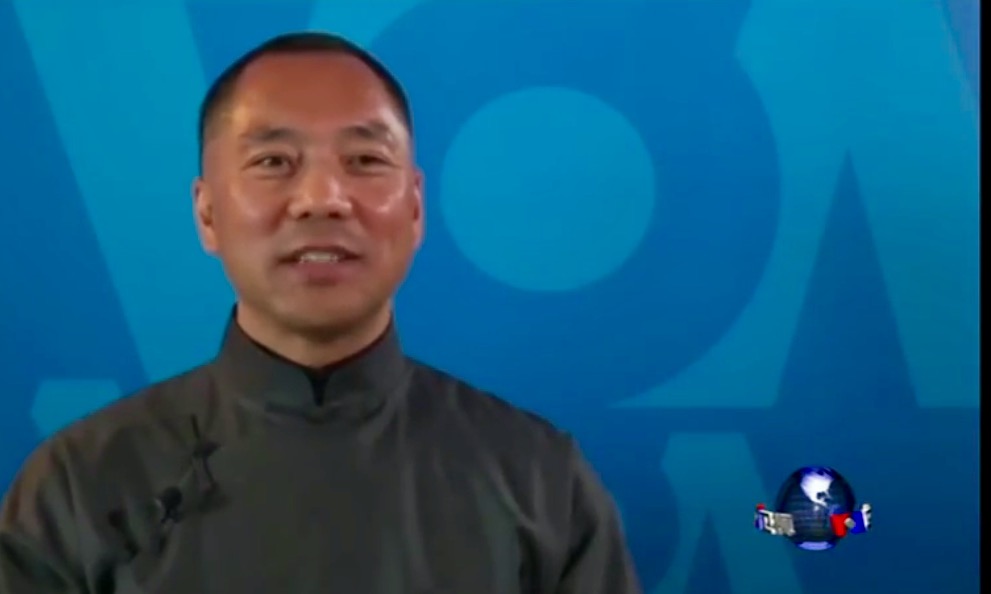BBG Watch Commentary
“A dispute over why Voice of America abruptly shut down an interview with a vocal critic of Beijing is raising questions about whether Chinese leadership influenced the U.S. broadcaster,” CNBC reporter Evelyn Cheng wrote in an online report posted Friday afternoon. VOA director Amanda Bennett had denied earlier that there had been any improper influence and repeated her denial to CNBC. In a recent letter to the Editor of the Wall Street Journal Bennett accused the VOA Mandarin Service chief Dr. Sasha Gong of not agreeing with “universally accepted journalistic principles.” Also in a letter to the Editor of the Wall Street Journal, former VOA director Robert R. Reilly defended Dr. Gong and her VOA Mandarin Service colleagues who are now under an investigation ordered by the VOA management.
Gong told CNBC last week “I suspect somebody caved in to the Chinese government’s demand, because the timing itself was very suspicious.” “Someone very, very powerful must be very, very afraid of this. Otherwise, nothing makes sense,” Dr. Gong is quoted in the CNBC report.
How an interview with one Chinese billionaire threw a US broadcaster into turmoil. Evelyn Cheng, CNBC, June 9, 2017
The CNBC report provided the background of the scandal which caused VOA to lose much of its reputation and credibility in China. But Evenlyn Cheng also uncovered a few interesting new details about the Broadcasting Board of Governors (BBG) investigation of the five VOA Mandarin Service reporters who had been put on administrative leave with pay by Amanda Bennett. The BBG is VOA’s parent agency. Its head is John Lansing who, like Bennett, was appointed to his position during the Obama administration.
Do any senior VOA or BBG officials and executives or their close family members have substantial investments in China?
While the CNBC report produced several new pieces of information about the Guo Wengui interview scandal, one of the key questions, which still remain unanswered, is whether any of the senior Voice of America officials and managers who had made the decision to shorten the interview, or their close family members, have any substantial financial or business interests in China or any property or investments that could be jeopardized if they ran afoul of Chinese communist government officials? There may still be more to the story than what is currently known and what has been already reported by CNBC and others. More investigative reporting, which incidentally has been highly promoted at the Voice of America by Bennett, may be needed, along with more time, to clear up some of the confusion. A congressional investigation and testimony under oath would be most likely to explain what really happened. Dr. Gong and her colleagues have asked for such an independent and impartial investigation.
One of the questions is whether any of the investigators hired at taxpayers’ expense by the BBG, presumably at the request of VOA executives, have any business interests in China, and thus depend on the good will and approval of Chinese communist officials for their businesses or businesses of their clients to succeed?
Bennett told the CNBC reporter that one of them is “probably as neutral and respected and ethical as anybody in the field.” Evelyn Cheng reported that the BBG-hired outside contract investigator “did not respond to a CNBC request for comment.”
Evelyn Cheng identified one of the investigators as working for a public relations firm which may be doing business in China. If true, this raises the question whether some BBG-hired investigators may have a conflict of interest in this BBG investigation of VOA Mandarin Service frontline journalists. The answer to this question is, however, not nearly as critical as knowing whether any of the senior Voice of America officials who were involved in the Guo Wengui interview decision, or their close family members, have major personal or corporate investments in China. If they do, it would be reasonable to ask whether such corporate or family investments could influence their decisions about reporting any news bound to upset Chinese officials who have the ultimate control over such investments, their continued presence in China, and their profitability. It would also be reasonable to ask whether such VOA or BBG officials could order, conduct or oversee an impartial investigation relating to communist China.
It is known that a few of the former and at least one current BBG Board member have been conducting private corporate business in both China and Russia. Some BBG managers even assisted some of them with their business trips.
Questions have also been raised by some VOA Mandarin Service journalists whether any of the BBG-hired private investigators employ assistants who are citizens of communist China. Some VOA employees are concerned that sensitive personal information about them may become compromised in this investigation. In a letter to the BBG Board, four of the five VOA Mandarin Service journalists being investigated wrote “We are afraid that our personal information might have been leaked to the Chinese government, and that our personal safety has been further jeopardized.”
